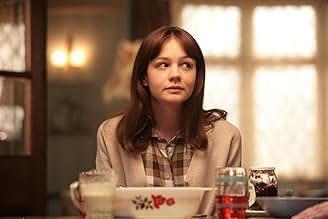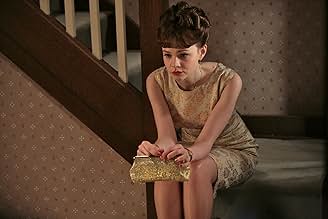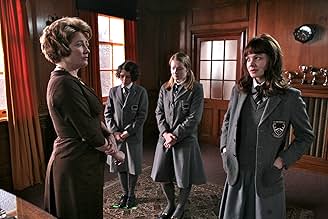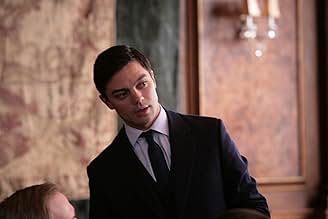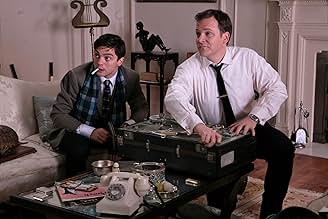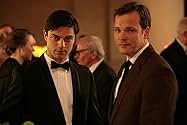IMDb रेटिंग
7.2/10
1.4 लाख
आपकी रेटिंग
एक व्यस्क कहानी, जो 1960 के दशक में उपनगरीय लंदन में एक किशोर लड़की, और उसकी उम्र के लगभग दुगने प्लेबॉय के आने से उसका जीवन कैसे बदल जाता है, इस बारे में है।एक व्यस्क कहानी, जो 1960 के दशक में उपनगरीय लंदन में एक किशोर लड़की, और उसकी उम्र के लगभग दुगने प्लेबॉय के आने से उसका जीवन कैसे बदल जाता है, इस बारे में है।एक व्यस्क कहानी, जो 1960 के दशक में उपनगरीय लंदन में एक किशोर लड़की, और उसकी उम्र के लगभग दुगने प्लेबॉय के आने से उसका जीवन कैसे बदल जाता है, इस बारे में है।
- 3 ऑस्कर के लिए नामांकित
- 36 जीत और कुल 96 नामांकन
Kate Duchêne
- Latin Teacher
- (as Kate Duchene)
फ़ीचर्ड समीक्षाएं
With excellent acting and excellent visuals this is a good film, as a Chaucerian cautionary tale, or a retake on Congreve, it succeeds in buckets. But more even than the excellent script by Nick Hornsby is a marvellous performance by Carey Mulligan.
It tackles what is an incredibly sensitive subject, more so today than even in its setting, the relationship between a teenager and an older man, with definite aplomb. What could have been either an anachronistic script filled with moral sensibilities that didn't surface in 1961 or a cheap and tawdry sensationalist production is handled with verve, humour, and brings both the wonder of first love and the seductive ability of that love to steer lives in directions we'd rather not go out in ways that work very well indeed.
Carey Mulligan has more than a touch of sensibility about her and is, obviously, the more mature, yet still a naive genué - her performance is to be admired for its ability to not switch characters but rather hold a fast course that is totally believable. I seriously cannot think of any debut in the past 20 years that has this weight. Like Taylor in National Velvet or Johnny Mill's daughter in Whistle Down the Wind you just know you are watching something very special indeed.
All the parts are very well written by Nick Hornsby and what we get is both complex and light, a witty drama with depth that truly evokes the post-Suez and Macmillan era; Britain before the Beatles but a Britain full of a generation who didn't wanted to be reminded of rationing and the Blitz, who were searching to get away from the drudgery of a boring job-for-life that was killing their parents by degrees.
While there are moments of real unease, not surprisingly given the subject matter, there is nothing to not recommend about this: it is thoughtful, funny, intriguing, and marks the start of a significant career for Carey Mulligan who will certainly become one of the leading British actresses of her generation.
It tackles what is an incredibly sensitive subject, more so today than even in its setting, the relationship between a teenager and an older man, with definite aplomb. What could have been either an anachronistic script filled with moral sensibilities that didn't surface in 1961 or a cheap and tawdry sensationalist production is handled with verve, humour, and brings both the wonder of first love and the seductive ability of that love to steer lives in directions we'd rather not go out in ways that work very well indeed.
Carey Mulligan has more than a touch of sensibility about her and is, obviously, the more mature, yet still a naive genué - her performance is to be admired for its ability to not switch characters but rather hold a fast course that is totally believable. I seriously cannot think of any debut in the past 20 years that has this weight. Like Taylor in National Velvet or Johnny Mill's daughter in Whistle Down the Wind you just know you are watching something very special indeed.
All the parts are very well written by Nick Hornsby and what we get is both complex and light, a witty drama with depth that truly evokes the post-Suez and Macmillan era; Britain before the Beatles but a Britain full of a generation who didn't wanted to be reminded of rationing and the Blitz, who were searching to get away from the drudgery of a boring job-for-life that was killing their parents by degrees.
While there are moments of real unease, not surprisingly given the subject matter, there is nothing to not recommend about this: it is thoughtful, funny, intriguing, and marks the start of a significant career for Carey Mulligan who will certainly become one of the leading British actresses of her generation.
Before I even get to the review, I want to let you know you can currently find this DVD for $2 on the bargain table at your local Blockbuster (if you live in the USA or Canada). Well worth the price.
Now let's get to the movie. If you're like me & somewhat unexcited by the May- December romance story (Lolita, Venus, Pippa Lee, Last Tango, every Woody Allen flick ever made), you might be asking yourself why you're even bothering. The story here is nothing new, and the description on the back of the DVD sums up the plot in 2 sentences: something about a young schoolgirl torn between her conservative life vs. the glamour life of jazz clubs, older men and sex. But despite this age-old premise, it's the presentation that makes it thoroughly engaging and satisfying.
For one thing, it's set in Britain in the early 1960s. The attitudes, costumes and speech instantly take us back to a time when perhaps the plot wasn't so predictable. Much like watching Three's Company which is so undeniably 70s, we are transported back to a time when the now-trite plot wasn't so trite. So even though part of you may sit there shaking your head thinking "I know where this is going", the overall effect is to experience the film not only through the eyes of a naïve 16-year-old but also through the eyes of a somewhat naïve society. Dark-skinned people are called negroes. The term "Jew" is batted around like an insult. Characters in general are hopelessly clueless compared to today's standards. But the film is presented in a way that we all (should) take it in stride.
For that, I'd say this is probably the most interesting of the May-December romance films I've seen. Also I like the fact that it follows the girl's (younger) point of view whereas all the above films take the man's (older) viewpoint which, especially in the case of Woody Allen & Bertolucci, can come across as the director's attempt to justify his own taste in women. This film, rather, stays away from the subjective morality argument and instead focuses on the consequences. So although the story is far from original, I have to admit that the overall tone is something I haven't seen before.
...with the exception of one amazing film, City of Lost Children (by the director of Amélie). Now there's a film that approaches the subject in a thoroughly unconventional and charming way. If you haven't seen that one, go find a copy right away.
PS Alfred Molina!! You'll love Alfie in An Education. If you're not already a fan of his, check out Chocolat, The Hoax, and you MUST see his skit in Coffee & Cigarettes.
Now let's get to the movie. If you're like me & somewhat unexcited by the May- December romance story (Lolita, Venus, Pippa Lee, Last Tango, every Woody Allen flick ever made), you might be asking yourself why you're even bothering. The story here is nothing new, and the description on the back of the DVD sums up the plot in 2 sentences: something about a young schoolgirl torn between her conservative life vs. the glamour life of jazz clubs, older men and sex. But despite this age-old premise, it's the presentation that makes it thoroughly engaging and satisfying.
For one thing, it's set in Britain in the early 1960s. The attitudes, costumes and speech instantly take us back to a time when perhaps the plot wasn't so predictable. Much like watching Three's Company which is so undeniably 70s, we are transported back to a time when the now-trite plot wasn't so trite. So even though part of you may sit there shaking your head thinking "I know where this is going", the overall effect is to experience the film not only through the eyes of a naïve 16-year-old but also through the eyes of a somewhat naïve society. Dark-skinned people are called negroes. The term "Jew" is batted around like an insult. Characters in general are hopelessly clueless compared to today's standards. But the film is presented in a way that we all (should) take it in stride.
For that, I'd say this is probably the most interesting of the May-December romance films I've seen. Also I like the fact that it follows the girl's (younger) point of view whereas all the above films take the man's (older) viewpoint which, especially in the case of Woody Allen & Bertolucci, can come across as the director's attempt to justify his own taste in women. This film, rather, stays away from the subjective morality argument and instead focuses on the consequences. So although the story is far from original, I have to admit that the overall tone is something I haven't seen before.
...with the exception of one amazing film, City of Lost Children (by the director of Amélie). Now there's a film that approaches the subject in a thoroughly unconventional and charming way. If you haven't seen that one, go find a copy right away.
PS Alfred Molina!! You'll love Alfie in An Education. If you're not already a fan of his, check out Chocolat, The Hoax, and you MUST see his skit in Coffee & Cigarettes.
It's early 1960's London. Jenny Mellor (Carey Mulligan) is a sheltered schoolgirl aiming to go to Oxford. She meets David Goldman (Peter Sarsgaard) one rainy afternoon. He's a mysterious older man who opens her eyes to the exciting world outside her life at home. He's so slick that even her parents fall for him. Only there's more of a dark side to David. He does questionable things to keep his highlife. She joins him as her live inevitable slide downwards.
It's annoying how easily deceived her father (Alfred Molina) is. He's more caricature than anything. There are some wonderful exchanges with Miss Stubbs (Olivia Williams). Peter Sarsgaard is so obviously slimy that it's offputting. Carey Mulligan is absolutely lovely. She puts in a great performance.
It's annoying how easily deceived her father (Alfred Molina) is. He's more caricature than anything. There are some wonderful exchanges with Miss Stubbs (Olivia Williams). Peter Sarsgaard is so obviously slimy that it's offputting. Carey Mulligan is absolutely lovely. She puts in a great performance.
I remember this film getting quite a lot of critical praise when it came out and so I was intrigued to see what all the fuss was about. Of course it got nowhere near being shown in my local cinema and so I waited patiently for it to show on TV. A screenplay by Nick Hornby based on a memoir by Lynn Barber and set in London in the early 1960's it has all the hallmarks of a decent production. You'll be glad to know that I agree with the critics, yes, it's pretty good. There were a couple of points where it could have gone off the rails, but fortunately it stayed on the tracks and we have a fine piece of work.
Jenny Mellor is a bright sixteen year old student whose parents have ambitions for her to study at Oxford University. She is slightly disenchanted with her lot though, and yearns to go out and experience the world while she is still young. By chance she meets David, a man more than twice her age, who recognises something in her and takes her to see the sights. Two friends of his, Danny and Helen come along and Jenny goes to concerts, sees art, dines in fine restaurants and even visits Paris. David does all this with Jenny's parent's permission, he is very persuasive. Of course all is not what it seems and her world is about to take a massive jolt and the many arguments she has made against conformity are about to be tested.
This is a very well made film which features a stand-out performance from Carey Mulligan as Jenny; she was really outstanding in the part. Peter Sarsgaard was suitably suave as David, as was Dominic Cooper as Danny. Both Alfred Molina and Cara Seymour did a good job as Jenny's parents, Jack and Marjorie. Rosamund Pike played the part of the, rather dim, Helen very well and Olivia Williams did a very good job as Jenny's teacher Miss Stubbs. Finally, a mention for Emma Thompson who had a nice cameo as the headmistress.
This film asks a lot of questions about how some parents try to control the lives of their children, although it's not the main point of the story. I really liked the way it was written but I still felt one or two bits could have done with tidying up (I'm sorry, I can't be specific – spoilers). Having said that, I did enjoy it very much and I really liked the ending. I would definitely watch it again sometime Recommended.
My Score: 7.6/10
Jenny Mellor is a bright sixteen year old student whose parents have ambitions for her to study at Oxford University. She is slightly disenchanted with her lot though, and yearns to go out and experience the world while she is still young. By chance she meets David, a man more than twice her age, who recognises something in her and takes her to see the sights. Two friends of his, Danny and Helen come along and Jenny goes to concerts, sees art, dines in fine restaurants and even visits Paris. David does all this with Jenny's parent's permission, he is very persuasive. Of course all is not what it seems and her world is about to take a massive jolt and the many arguments she has made against conformity are about to be tested.
This is a very well made film which features a stand-out performance from Carey Mulligan as Jenny; she was really outstanding in the part. Peter Sarsgaard was suitably suave as David, as was Dominic Cooper as Danny. Both Alfred Molina and Cara Seymour did a good job as Jenny's parents, Jack and Marjorie. Rosamund Pike played the part of the, rather dim, Helen very well and Olivia Williams did a very good job as Jenny's teacher Miss Stubbs. Finally, a mention for Emma Thompson who had a nice cameo as the headmistress.
This film asks a lot of questions about how some parents try to control the lives of their children, although it's not the main point of the story. I really liked the way it was written but I still felt one or two bits could have done with tidying up (I'm sorry, I can't be specific – spoilers). Having said that, I did enjoy it very much and I really liked the ending. I would definitely watch it again sometime Recommended.
My Score: 7.6/10
In the cinema certain historical periods have become associated with a particular set of ideas. The 1960s represent change, progress and excitement whereas the 1950s are frequently regarded as a period of stifling social conformity. Of course, the "swinging sixties" did not necessarily start to swing on 1st January 1960, and in retrospect the first few years of the decade seem to have more in common with the conformist fifties than with the "swinging London" era of the later sixties. Certainly, many young people during this period regarded London as a dull, conservative place, and looked eagerly to foreign cities, especially Paris, as being more exciting and radical. There was an enthusiasm for everything French- French philosophy, French literature, French cinema, French fashions, even French jazz and French cigarettes. This Francophilia doubtless included elements of wishful thinking- De Gaulle's Fifth Republic was a more conservative place than many Britons realised- but it was nevertheless an influential phenomenon. It is a phenomenon explored in Julian Barnes' novel "Metroland" (later filmed), and also in this film.
The main character is Jenny, a teenage schoolgirl living in the London suburb of Twickenham in 1961. Jenny is highly intelligent, and is studying hard with a view to taking the entrance exams to Oxford University. She is not, however, really sure why she wants to go to Oxford, except that she is being pushed to do so by her parents who feel that university is the best place for her to meet a wealthy husband.
Jenny's life changes when she meets a handsome and charming older man named David. They quickly become close friends and begin dating. David is clearly wealthy, and claims to be an art dealer and property developer. More important to Jenny, however, is his knowledge of culture. He is well up with all the latest intellectual and artistic fashions from France and takes her to concerts and jazz clubs. What really impresses her is that he takes her to Paris. Eventually, David proposes to Jenny and she accepts and drops out of school without taking her A-levels, her Oxford ambitions abandoned.
Many parents would be worried about the idea of their sixteen-year-old daughter being romanced by a thirty-something man, especially if his influence leads her to neglect her education, but Jenny's parents, especially her complacent, Philistine father, seem strangely unconcerned. His argument is that as Jenny has now found a wealthy suitor there will be no need for her to use Oxford as a dating agency. His one objection to David as a son-in-law seems to be that he is Jewish. (Anti-Semitism was unfortunately widespread in British society at this period). Yet it is obvious to the audience that there is a darker side to David's character. His business methods are, to say the least, not beyond reproach (the character may have been based upon the notorious slum landlord Peter Rachman) and he never takes Jenny to his home, always meeting her in a luxurious flat belonging to his friend and business partner Danny. Eventually, even Jenny herself begins to suspect that David is not all he seems.
The title "An Education" can be understood on two levels. As a coming-of-age drama it narrates Jenny's metaphorical "education" in the wider sense of learning lessons about life. Yet it obviously also deals with her education in the narrower, literal sense of the word. It raises similar issues to another great British film, "Educating Rita", namely whether it is formal academic education or informal education to be gained in the outside world which is the more valuable. Jenny drops out of school because she believes that she can better acquire knowledge, both of high culture and of the ways of the world, through her life with David than through academic study. (Jenny's vision of her future life envisages her living with David in Paris on the Rive Gauche, reading Sartre, smoking Gauloises and going to the cinema to see the latest productions of the Nouvelle Vague). It seems hard to blame her for this conclusion, given that in the film the main advocate of the life academic is her headmistress, an intellectual snob and virulent anti-Semite ("The Jews killed Our Lord!") who serves as a reminder that an educated mind is not necessarily an open one. It is only when she becomes disillusioned with David that Jenny starts to reassess her priorities.
Her performance in the lead role has led to Carey Mulligan being hailed as the "new Audrey Hepburn", although the main point of resemblance seems to be that at one point in the film Jenny sports (as many young women doubtless did in the early sixties) a Hepburn-style hairdo. Nevertheless, on the basis of this performance Mulligan would appear to be a highly promising star in the making, perhaps the new Keira Knightley. Although she is actually 24, she always seems entirely believable as a naive young teenager. Other good contributions come from Peter Sarsgaard as the smooth, reptilian David, Alfred Molina as Jenny's comical, blustering father, Rosamund Pike as Danny's airheaded mistress Helen and Emma Thompson in an excellent cameo as the obnoxious headmistress.
Period drama is something the British cinema often does well, and "An Education" falls within this tradition, even though it has a Danish director, Lone Scherfig. 2009 has already seen two good British costume dramas, "The Young Victoria" and "Dorian Gray", but "An Education" is an even better one. It is not only a study of a girl on the verge of womanhood, but also an exploration of issues such as social class, racism and the value of education. One of the best British films of recent years. I hope that the Academy will remember it when next year's Oscars are being handed out. 9/10
The main character is Jenny, a teenage schoolgirl living in the London suburb of Twickenham in 1961. Jenny is highly intelligent, and is studying hard with a view to taking the entrance exams to Oxford University. She is not, however, really sure why she wants to go to Oxford, except that she is being pushed to do so by her parents who feel that university is the best place for her to meet a wealthy husband.
Jenny's life changes when she meets a handsome and charming older man named David. They quickly become close friends and begin dating. David is clearly wealthy, and claims to be an art dealer and property developer. More important to Jenny, however, is his knowledge of culture. He is well up with all the latest intellectual and artistic fashions from France and takes her to concerts and jazz clubs. What really impresses her is that he takes her to Paris. Eventually, David proposes to Jenny and she accepts and drops out of school without taking her A-levels, her Oxford ambitions abandoned.
Many parents would be worried about the idea of their sixteen-year-old daughter being romanced by a thirty-something man, especially if his influence leads her to neglect her education, but Jenny's parents, especially her complacent, Philistine father, seem strangely unconcerned. His argument is that as Jenny has now found a wealthy suitor there will be no need for her to use Oxford as a dating agency. His one objection to David as a son-in-law seems to be that he is Jewish. (Anti-Semitism was unfortunately widespread in British society at this period). Yet it is obvious to the audience that there is a darker side to David's character. His business methods are, to say the least, not beyond reproach (the character may have been based upon the notorious slum landlord Peter Rachman) and he never takes Jenny to his home, always meeting her in a luxurious flat belonging to his friend and business partner Danny. Eventually, even Jenny herself begins to suspect that David is not all he seems.
The title "An Education" can be understood on two levels. As a coming-of-age drama it narrates Jenny's metaphorical "education" in the wider sense of learning lessons about life. Yet it obviously also deals with her education in the narrower, literal sense of the word. It raises similar issues to another great British film, "Educating Rita", namely whether it is formal academic education or informal education to be gained in the outside world which is the more valuable. Jenny drops out of school because she believes that she can better acquire knowledge, both of high culture and of the ways of the world, through her life with David than through academic study. (Jenny's vision of her future life envisages her living with David in Paris on the Rive Gauche, reading Sartre, smoking Gauloises and going to the cinema to see the latest productions of the Nouvelle Vague). It seems hard to blame her for this conclusion, given that in the film the main advocate of the life academic is her headmistress, an intellectual snob and virulent anti-Semite ("The Jews killed Our Lord!") who serves as a reminder that an educated mind is not necessarily an open one. It is only when she becomes disillusioned with David that Jenny starts to reassess her priorities.
Her performance in the lead role has led to Carey Mulligan being hailed as the "new Audrey Hepburn", although the main point of resemblance seems to be that at one point in the film Jenny sports (as many young women doubtless did in the early sixties) a Hepburn-style hairdo. Nevertheless, on the basis of this performance Mulligan would appear to be a highly promising star in the making, perhaps the new Keira Knightley. Although she is actually 24, she always seems entirely believable as a naive young teenager. Other good contributions come from Peter Sarsgaard as the smooth, reptilian David, Alfred Molina as Jenny's comical, blustering father, Rosamund Pike as Danny's airheaded mistress Helen and Emma Thompson in an excellent cameo as the obnoxious headmistress.
Period drama is something the British cinema often does well, and "An Education" falls within this tradition, even though it has a Danish director, Lone Scherfig. 2009 has already seen two good British costume dramas, "The Young Victoria" and "Dorian Gray", but "An Education" is an even better one. It is not only a study of a girl on the verge of womanhood, but also an exploration of issues such as social class, racism and the value of education. One of the best British films of recent years. I hope that the Academy will remember it when next year's Oscars are being handed out. 9/10
क्या आपको पता है
- ट्रिवियाThe creative team was initially worried about casting the 22-year-old Carey Mulligan in the role of a 16-year-old but was convinced by her screentest. Rosamund Pike reportedly really wanted the small part of Helen because "no one ever lets me be funny."
- गूफ़When Jenny finally passes her A levels, she mentions grades. The film is set in 1961 - A level grades were first introduced in 1963. Although,when she's studying at home, it is implied that a significant amount of time passes, it is unlikely to have taken her beyond 1962 when, essentially, you either passed or failed GCE exams.
- क्रेज़ी क्रेडिटThe opening credits are shown against a background of animated chalk-like drawings, all illustrating various stages and segments of "an education," although not sequentially.
- कनेक्शनFeatured in The 81st Annual Academy Awards (2009)
- साउंडट्रैकSmoke Without Fire
Written by Duffy and Bernard Butler
Performed by Duffy
Courtesy of A&M/Polydor Records (UK), Mercury Records (US)
टॉप पसंद
रेटिंग देने के लिए साइन-इन करें और वैयक्तिकृत सुझावों के लिए वॉचलिस्ट करें
विवरण
- रिलीज़ की तारीख़
- कंट्री ऑफ़ ओरिजिन
- आधिकारिक साइट
- भाषाएं
- इस रूप में भी जाना जाता है
- Enseñanza de vida
- फ़िल्माने की जगहें
- Bloomsbury Service Station - 6 Store Street, Bloomsbury, लंदन, इंग्लैंड, यूनाइटेड किंगडम(Jenny finds the letter)
- उत्पादन कंपनियां
- IMDbPro पर और कंपनी क्रेडिट देखें
बॉक्स ऑफ़िस
- बजट
- $75,00,000(अनुमानित)
- US और कनाडा में सकल
- $1,25,74,914
- US और कनाडा में पहले सप्ताह में कुल कमाई
- $1,59,017
- 11 अक्तू॰ 2009
- दुनिया भर में सकल
- $2,60,96,852
- चलने की अवधि1 घंटा 40 मिनट
- रंग
- ध्वनि मिश्रण
- पक्ष अनुपात
- 2.35 : 1
इस पेज में योगदान दें
किसी बदलाव का सुझाव दें या अनुपलब्ध कॉन्टेंट जोड़ें








